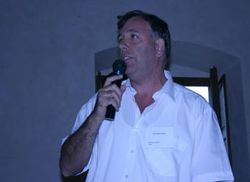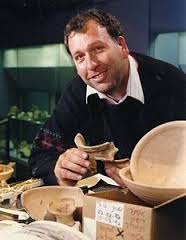Difference between revisions of "Hanan Eshel (1958-2010), scholar"
| (7 intermediate revisions by the same user not shown) | |||
| Line 1: | Line 1: | ||
[ | [[File:Hanan_Eshel.jpg|thumb|250px|]] | ||
[[File:Hanan_Eshel2.jpg|thumb|250px|]] | |||
'''Hanan Eshel''' (1958-2010) was an Israeli scholar. Received his PhD (1994) from the Hebrew University of Jerusalem. One of leading international specialists in the Dead Sea Scrolls, was professor in the Dept. of Land of Israel Studies and Archaeology at Bar-Ilan University, Ramat Gan, Israel. Visiting professor at the Universities of Harvard, Michigan, and Oxford. Co-Founder and Co-Director of the [[Enoch Seminar]], he contributed to all its first five meetings, from Florence (2001) to Naples (2009). | |||
* [[Archaeology]] -- [[Archaeologists]] -- [[Enoch Seminar]] -- [[Qumran Studies]] -- [[Second Temple Studies]] | |||
==Works == | |||
====Books==== | |||
*[[Me`arot ha-miflat mi-tekufat mered Bar-Kokhva (1998 Eshel/Amit), book]] | *[[Me`arot ha-miflat mi-tekufat mered Bar-Kokhva (1998 Eshel/Amit), book]] | ||
*[[Megilot Kumran veha-medinah ha-Hashmonait (2004 Eshel), book]] | *[[Megilot Kumran veha-medinah ha-Hashmonait (2004 Eshel), book]] | ||
| Line 36: | Line 21: | ||
====Edited volumes==== | ====Edited volumes==== | ||
*[[Yeme bet Hashmonai (1995 Amit/Eshel), edited volume]] | *[[Yeme bet Hashmonai (1995 Amit/Eshel), edited volume]] | ||
*[[Hidushim be-heker mered Bar Kokhba (2001 Eshel/Zissu), edited volume]] | *[[Hidushim be-heker mered Bar Kokhba (2001 Eshel/Zissu), edited volume]] | ||
| Line 41: | Line 27: | ||
====Articles in edited volumes==== | ====Articles in edited volumes==== | ||
*4QMMT and the History of the Hasmonean Period / Hanan Eshel - [[Reading 4QMMT (1996 Kampen/Bernstein), edited volume]] | *4QMMT and the History of the Hasmonean Period / Hanan Eshel - [[Reading 4QMMT (1996 Kampen/Bernstein), edited volume]] | ||
*[[The Damascus Document: A Centennial of Discovery (2000 Baumgarten/Chazon), edited volume]] | *[[The Damascus Document: A Centennial of Discovery (2000 Baumgarten/Chazon), edited volume]] | ||
| Line 51: | Line 38: | ||
*Damascus document's "Three nets of Belial": A reference to the Aramaic Levi document? / Hanan Eshel - [[Heavenly Tablets (2007 LiDonnici/Lieber), edited volume]] | *Damascus document's "Three nets of Belial": A reference to the Aramaic Levi document? / Hanan Eshel - [[Heavenly Tablets (2007 LiDonnici/Lieber), edited volume]] | ||
== | ==Obituary (8 April 2010)== | ||
It is with great sorrow, that I am writing about the death of our dear friend and colleague, and co-Director of the Enoch Seminar, Hanan Eshel. | |||
Our warmest thoughts are with his wife, Esti, his family and friends. | |||
It is a devastating loss for the entire scholarly community. It seems hard today to imagine any edited volumes, research projects, or international conferences, directly or indirectly related to the Dead Sea Scrolls, without his presence and contribution. | |||
Hanan was the driving force of the Enoch Seminar (an energetic and passionate co-Director of the project). He attended all its biennial sessions, contributing decisively to the success of the project, not only through his scholarly contribution but also fostering a positive atmosphere of collaboration and productive exchange. | |||
His scholarly legacy is a precious gift to all of us, but here I would rather like to remember Hanan the man and the friend. His scholarly reputation was the result of hard work, substantial achievements, but primarily of the immense love and passion he had for what he studied. Hanan’s enthusiasm and energy were irresistible, almost legendary, and highly contagious, an enthusiasm and optimism that he maintained to the last days, even facing his illness. | |||
Hanan was not only interested in work, he was interested in people. I know it well by experience, during all the time we spent together in Italy, Israel, and Ann Arbor. On more than one occasion I received from him not only support as a colleague, but help and encouragement as a friend. Many times, both publicly and privately, we talked about how the study of Second Temple Judaism is essential not only for the self-understanding of Jews and Christians but also for their relationships today. We both shared the same dream of reconciliation and mutual understanding and were aware of the responsibility that as scholars we have to find common ground in the study of this crucial period of Christian and Rabbinic origins. | |||
I was happy he could share once more the Italian experience of the Enoch Seminar in Naples and had time for a trip to Capri with Esti, on a beautiful Sunday afternoon. When he left at the end of the conference, he hugged me with his strong arms and whispered: "I'm dying, Gabriele, I don't know if I will make it for another Enoch Seminar but I will try as hard as I can." We silently struggled not to cry, as I am struggling now that I am writing these notes... I miss you, Hanan. I miss you so much. | |||
[[Gabriele Boccaccini]] | |||
[[Category: | [[Category:E-Es|Eshel Hanan]] | ||
[[Category:Scholars|1958 Eshel Hanan]] | |||
[[Category:Archaeologists|1958 Eshel Hanan]] | [[Category:Archaeologists|1958 Eshel Hanan]] | ||
[[Category:Israeli|1958 Eshel Hanan]] | [[Category:Israeli|1958 Eshel Hanan]] | ||
Latest revision as of 11:27, 4 November 2019
Hanan Eshel (1958-2010) was an Israeli scholar. Received his PhD (1994) from the Hebrew University of Jerusalem. One of leading international specialists in the Dead Sea Scrolls, was professor in the Dept. of Land of Israel Studies and Archaeology at Bar-Ilan University, Ramat Gan, Israel. Visiting professor at the Universities of Harvard, Michigan, and Oxford. Co-Founder and Co-Director of the Enoch Seminar, he contributed to all its first five meetings, from Florence (2001) to Naples (2009).
Works
Books
- Me`arot ha-miflat mi-tekufat mered Bar-Kokhva (1998 Eshel/Amit), book
- Megilot Kumran veha-medinah ha-Hashmonait (2004 Eshel), book
- Kumran: megilot, me`arot, historyah (2009 Eshel), book
- Metsadah (2009 Eshel), book
- 'En Gedi (2009 Eshel), book
Edited volumes
- Yeme bet Hashmonai (1995 Amit/Eshel), edited volume
- Hidushim be-heker mered Bar Kokhba (2001 Eshel/Zissu), edited volume
- The Samaritans (2002 Stern/Eshel), edited volume
Articles in edited volumes
- 4QMMT and the History of the Hasmonean Period / Hanan Eshel - Reading 4QMMT (1996 Kampen/Bernstein), edited volume
- The Damascus Document: A Centennial of Discovery (2000 Baumgarten/Chazon), edited volume
- Documents of the First Jewish Revolt from the Judean desert / Hanan Eshel - The First Jewish Revolt (2002 Berlin/Overman), edited volume
- Aqueducts in the Copper scroll / Hanan Eshel - Copper Scroll Studies (2002 Brooke/Davies), edited volume
- Another Fragment (3a) of 4QShirot 'Olat HaShabbat b (4Q401) / Hanan Eshel - Liturgical Perspectives: Prayer and Poetry in Light of the Dead Sea Scrolls (2003 Chazon), edited volume
- Dibre Hame'orot and the Apocalypse of Weeks / Hanan Eshel - Things Revealed: Studies in Early Jewish and Christian Literature (2004 Chazon/Satran/Clements), edited volume
- Qumran and the Dead Sea scrolls / Magen Broshi and Hanan Eshel - Religion and Society in Roman Palestine (2004 Edwards), edited volume
- An Allusion in the Parables of Enoch to the Acts of Matthias Antigonus in 40 BCE? / Hanan Eshel - Enoch and the Messiah Son of Man (2007 Boccaccini), edited volume
- Damascus document's "Three nets of Belial": A reference to the Aramaic Levi document? / Hanan Eshel - Heavenly Tablets (2007 LiDonnici/Lieber), edited volume
Obituary (8 April 2010)
It is with great sorrow, that I am writing about the death of our dear friend and colleague, and co-Director of the Enoch Seminar, Hanan Eshel.
Our warmest thoughts are with his wife, Esti, his family and friends.
It is a devastating loss for the entire scholarly community. It seems hard today to imagine any edited volumes, research projects, or international conferences, directly or indirectly related to the Dead Sea Scrolls, without his presence and contribution.
Hanan was the driving force of the Enoch Seminar (an energetic and passionate co-Director of the project). He attended all its biennial sessions, contributing decisively to the success of the project, not only through his scholarly contribution but also fostering a positive atmosphere of collaboration and productive exchange.
His scholarly legacy is a precious gift to all of us, but here I would rather like to remember Hanan the man and the friend. His scholarly reputation was the result of hard work, substantial achievements, but primarily of the immense love and passion he had for what he studied. Hanan’s enthusiasm and energy were irresistible, almost legendary, and highly contagious, an enthusiasm and optimism that he maintained to the last days, even facing his illness.
Hanan was not only interested in work, he was interested in people. I know it well by experience, during all the time we spent together in Italy, Israel, and Ann Arbor. On more than one occasion I received from him not only support as a colleague, but help and encouragement as a friend. Many times, both publicly and privately, we talked about how the study of Second Temple Judaism is essential not only for the self-understanding of Jews and Christians but also for their relationships today. We both shared the same dream of reconciliation and mutual understanding and were aware of the responsibility that as scholars we have to find common ground in the study of this crucial period of Christian and Rabbinic origins.
I was happy he could share once more the Italian experience of the Enoch Seminar in Naples and had time for a trip to Capri with Esti, on a beautiful Sunday afternoon. When he left at the end of the conference, he hugged me with his strong arms and whispered: "I'm dying, Gabriele, I don't know if I will make it for another Enoch Seminar but I will try as hard as I can." We silently struggled not to cry, as I am struggling now that I am writing these notes... I miss you, Hanan. I miss you so much.

